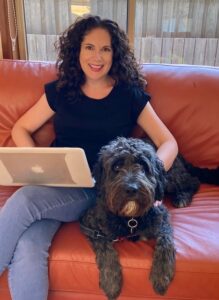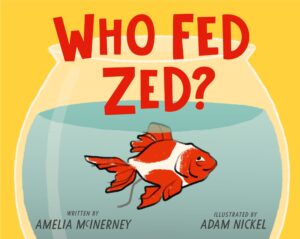Amelia McInerney, author of Who Fed Zed?, chats to Reading Time reviewer, Maura Pierlot about their book, published by Allen & Unwin.

Why Zed? Why now?
On the surface, Who Fed Zed? is a funny story about a goldfish-feeding mix-up, but on a deeper level it’s about food allergy and the importance of reading food labels. I think it bubbled up from my subconscious because my eldest child has anaphylactic allergies to several nuts, and once when she was four, I made a mistake and gave her a muesli bar that contained peanut (yes, there was a mix-up and no, I didn’t check the label.) I think when a writer has a strong emotional reaction (like, say, enormous fear and guilt) to something that happens in their life, that thing can work its way into a story, even years later. As for the name ‘Zed’, I think having characters whose names all rhyme (Ned, Ted, Fred, Jed, etc.) and also presenting the whole story in monorhyme, helps soften the story and give it a more playful, accessible tone. Mostly, I hope people simply enjoy this zany book! But for those who see the link, I also hope it might spark helpful conversations about food allergies, intolerances, and the importance of avoiding allergens and of reading food labels.
You write funny picture books. How does humour help children learn and develop?
I think humour can help make books more appealing, and help kids better engage with books. Young readers then benefit from thinking/learning about the content in the book and also become more empathetic: ‘A reader lives a thousand lives before he dies.’ And then, of course, there are the literacy gains. Essentially, I think if children enjoy books, they’re more likely to seek them out and make reading a part of their lives.
You often write in rhyme. What is the greatest challenge when writing rhyme?
The greatest challenge is not actually about the rhyming words at the end of the lines – that’s the easy part. The greatest challenge is getting the meter right; the rhythm of the words in each line. The challenge is to tell a good story in a clear, consistent meter without using any extraneous words.
Has Zed swum overseas yet?
I am happy to report that Who Fed Zed? is now available in several UK department stores and bookshops!
Any plans to branch beyond picture books?
Yes. I’d like to branch out into chapter books and perhaps also graphic novels/early readers. Alongside picture books, of course – I think I’ll always love writing picture books!
What must-haves can be found in your workspace?
None, besides my work-in-progress. Sometimes I have a story going on my laptop, and sometimes I use an exercise book. When I write by hand, I like to use a soft pencil, but they seem to disappear (the pencils, not my hands) in which case I write with anything (like with a pen, not my feet.) But if I don’t have access to my current work-in-progress (or I can’t be bothered finding where I left that exercise book), I’ll just work on another story – I always have a few on the go – or brainstorm something new. I work in different places around the house and backyard, and also in the car or poolside while my kids do their after-school activities. I do make a few coffees a day, but those are probably more ‘shouldn’t-haves’ than ‘must-haves’ .😉
Describe your writing style and aspirations in one sentence.
Let’s see…
Wild, word-wielding woman wanting world-wide wins. Also adores alliteration.
Oh dang, that’s two sentences.
Ok seriously, I’d say that my writing is vibrant, playful and funny and I hope that I get to keep publishing stories that kids and adults enjoy.
What comes first for you – the plot or the characters – and why?
Definitely the characters. I never know what is going to happen in the story, although I usually know part of the plot as soon as the main character/s come to me. (I usually know the beginning, but sometimes I know the end instead, and sometimes I might just have a vague idea of what happens in the middle.) I start writing at the start of the story and the plot unfolds line by line. Which is probably why I find writing so much fun, because I’m always wondering (and finding out) what happens next, even though I’m the one making it up.
Who would write your biography and what would its title be? (Or what is the title of your future memoir?)
I don’t think anyone would want to write my biography but to answer this question, you need to know that before I became an author, I did ultrasounds for fifteen years. So, if I were to write my memoir now (or ever) it would probably be called ‘Confessions of an Approachable Sonographer – Stuff People Told Me in that Dark Little Room.’ I reckon it would it SELL.
What is the most valuable piece of writing advice you’ve been given (and by whom)?
Probably to ‘write from the heart’. I’m not sure who coined this phrase but it’s well-known advice among writers. At first, I thought ‘write from the heart’ meant ‘write sappy books about your emotions’, but now I take it to mean ‘write in a way that feels authentic to you’. I think that’s the key to good writing of any kind.
Does writing energise or exhaust you (or both)?
Writing energises me. I know some writers loathe writing but love having written, but I really love the writing process. I enjoy disappearing into another world, playing with words and making up characters and the journeys they go on.
What is your favourite word/s and why?
I love so many words! Especially if they sound funny or conjure up an unusual image, like, say, ‘lackadaisical’ – makes me think of a daisy that is so lazy it keeps flopping over.
What is your greatest challenge when writing?
Probably knowing when a story is finished. It’s easy to waver between being sure it is as good as it can be, and wondering if I should go back and rewrite the whole thing.
Who would be the guests (living or deceased) at your literary dinner party, and why?
Margaret Wise Brown, so I could ask her a zillion questions about her unconventional books, Dr. Seuss because I wonder what he’s like, Paul Jennings because I think he is as lovely as he is talented, a top transatlantic literary agent so I could pick their brains about overseas book markets, Julia Donaldson for the same reason as Paul Jennings, plus Sandra Boynton, Doreen Cronin, Jon Agee and Roald Dahl because… I love their books!
What would you say to your 13-year-old self?
Adult me: It’s me!
13 y.o me: Who?!
Adult me: You! From the future! I’ve come back to tell you the good news—
13 y.o me: Is that my natural hair?!
Adult me: Yes. Just stop brushing your hair and it will look like this. Listen, I’ve come to tell you that you don’t need to study so much in high school and uni because you chuck in radiography and sonography to be a children’s author!
13 y.o me: Oh, yay!
Adult me: I know! But the bad news is, you drive a minivan.
13 y.o me: K
Adult me: Oh, and instead of selling your first car, a 1976 Holden HX Premier that you respray and put fat tyres on, keep it! It’ll be worth a bomb one day. Then you can buy a better minivan!
Thanks, Amelia and good luck with your book!
See Maura’s review here.


